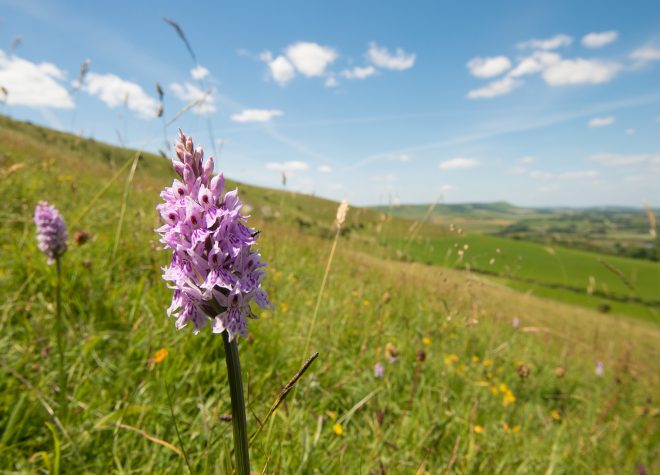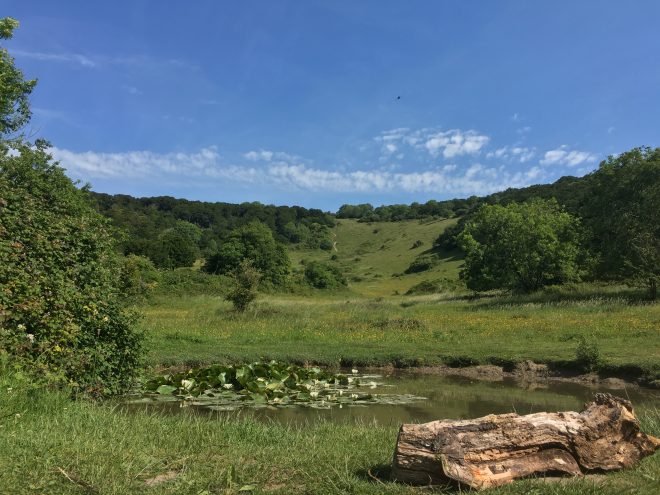Multimillion pound funding to help restore South Downs chalk grassland
November 2, 2021

Its beautiful butterflies and colourful wildflowers are unmistakeable, giving chalk grassland the enviable nickname of “Europe’s tropical rainforest in miniature”.
Now a major partnership has secured £2.23m of funding to help restore this incredibly fragile habitat, which is synonymous with the beauty and biodiversity of the South Downs National Park.
The Changing Chalk partnership, which is led by the National Trust and includes the National Park Authority and eight other organisations, will work with local communities across the eastern Downs to restore and protect chalk grassland, bring diverse histories to life and provide new experiences in the outdoors to those who need it most.
A clutch of new jobs, apprenticeships and training opportunities will also be created across Brighton & Hove, Eastbourne and Lewes, while around 2,500 volunteers will have the chance to learn new skills and support the partnership’s vision.
It comes as chalk grassland is under considerable threat, with around 80 per cent lost since the Second World War.
Changing Chalk will address the challenges over the next four years, by bringing the eastern Downs and towns closer together. Eighteen ambitious projects will restore and protect nature and wildlife, break down complex barriers to participation in the outdoors, improve wellbeing and celebrate the heritage that has shaped the South Downs over the past 6,000 years.
Supported by the National Lottery Heritage Fund, 18 interconnected projects will deliver Changing Chalk’s vision across three areas:
Restoring biodiversity
Just four per cent of the National Park’s chalk grassland remains and the sites that are left are small and isolated, threatening the wildlife that depends on them.
Two new Chalk Life Rangers and an Education Ranger will lead community activities to support the care and restoration of chalk grassland. NEET (Not in Education, Employment or Training) programmes, apprenticeships and volunteering will promote skills development and give more young people an opportunity to discover the South Downs National Park.
Over the four years partners will support the management of more than 800ha of land for nature, including 60ha of golf course returned to species-rich chalk downland and 40 sites returned to active grazing. Five new dew ponds, as well as new wildflower meadows and enhanced habitat for pollinators, will also be established. National Nature Reserves and Local Wildlife Sites will be improved and vital habitat research funded.
Farmers and land managers will be supported in sustainable management of chalk grassland to improve its ecological resilience to the effects of climate change by re-connecting fragmented areas.
Connecting Downs and Towns
The partnership will improve well-being through connection with the local landscape. Eco-therapy activities will benefit local people with physical and mental health needs, and new accessible maps co-created with local charities will help underserved and less physically able communities to access green space. Meanwhile the South Downs will come to the towns with new chalk grassland planting on 12 city sites.
In addition, a Community Grants Scheme will award £150,000 to local communities for community-led initiatives supporting Changing Chalk’s vision.
Hearts and Histories of the South Downs
There will be community excavation projects in Eastbourne, the chance to ‘adopt’ local monuments and annual celebrations for Gypsy, Roma and Traveller History Month. There will also be creative writing, storytelling and other arts and cultural activity to engage writers and audiences of Black, Asian and ethnically-diverse people.
The South Downs National Park Authority will be leading on the grazing project, working with farmers and landowners to establish more conservation grazing to help restore and improve chalk grassland.
The Authority will also be driving the restoration of five dew ponds to help wildlife thrive. The restored dew ponds, all close to the South Downs Way national trail, will have potential for wider interpretation and education.

Claire Kerr, Countryside Policy Manager for the area of the National Park where Changing Chalk is taking place, said: “Chalk grassland was one of the reasons for the designation of the South Downs National Park as it’s such a rare habitat. It can have up to 40 different wildflowers in a single square metre and over 20 different butterfly species.
“Farmers and land managers are absolutely key to chalk grassland restoration and enhancement, through practices such as conservation grazing, and we’re looking forward to working closely with them to help deliver this inspiring project.”
For more information, including updates on how to get involved, visit www.nationaltrust.org.uk/projects/the-changing-chalk-partnership
